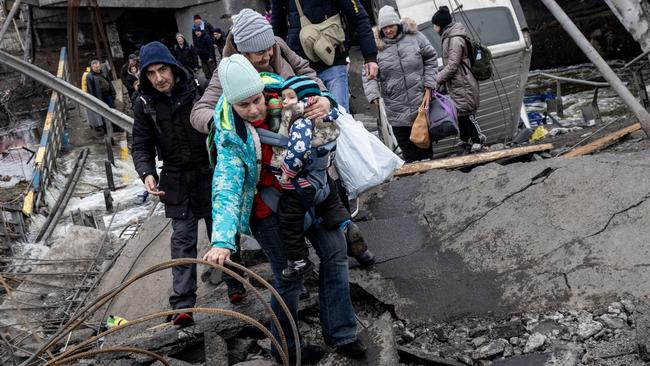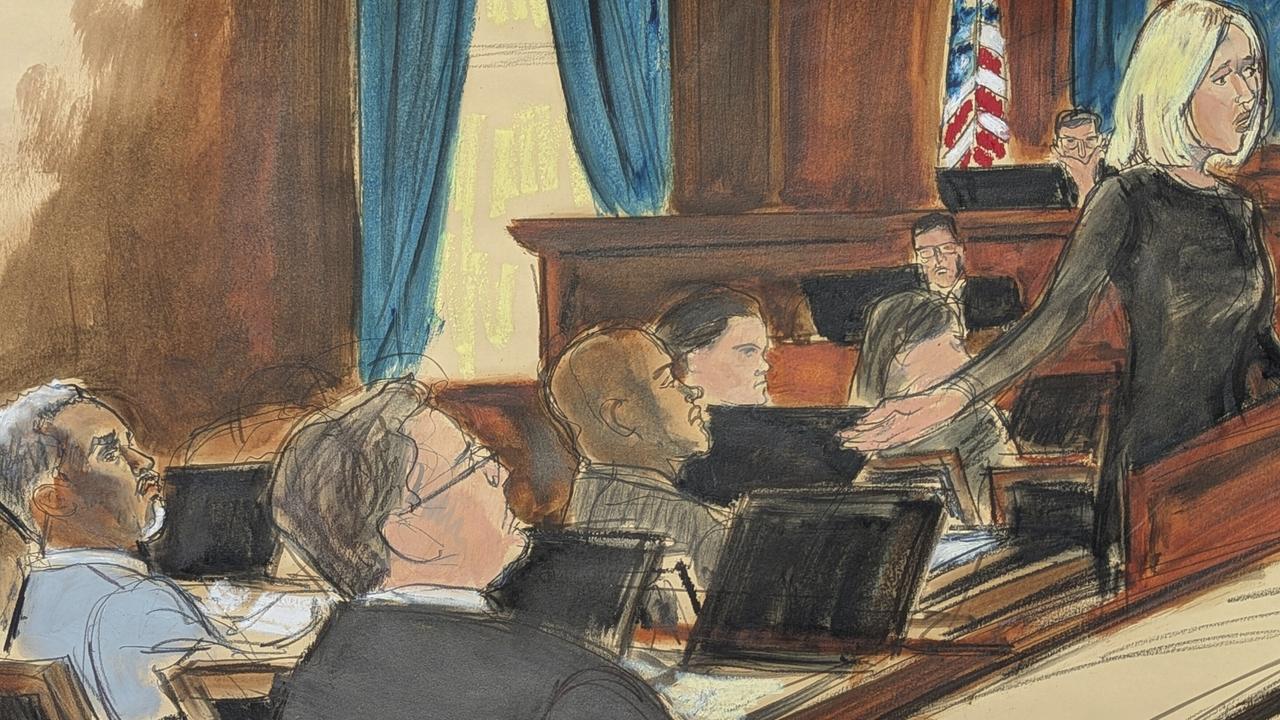In Ukraine, World War II memories echo as Russia attacks its cities
Zelensky uses Soviet-era terms to extol bravery as Ukraine faces an assault unlike any in Europe since the 1940s.

Billboards on the streets of Kyiv these days project the opening verse of a 1942 Soviet song about the German invasion.
“On June 22, precisely at 4am, Kyiv was bombed and we have been told that the war has begun,” it goes.
Russia’s war on Ukraine also began with the bombing of Kyiv shortly after 4am, a parallel not lost on its residents. Eight million Ukrainians died in World War II, a conflict that devastated the country and remains – as in Russia – seared into the collective memory.
Now, as Ukrainian cities are being pounded by deadly Russian artillery and airstrikes, an assault that Europe hasn’t seen since the 1940s, the memory of that pain provides a frame of reference for many Ukrainians.
Streets that until two weeks ago were crowded with fashion stores, fusion restaurants and busy dive bars now have anti-tank obstacles, trenches and sandbags. Residents are saying the city’s new face reminds them of how it looked in black-and-white 1940s newsreels. Except now it is in colour, and real.
“The war that Russia conducts here is not a 21st-century war but very much a 20th-century one,” said Ukrainian novelist Andrey Kurkov, who writes in Russian. “Tanks, bombardments, the destruction of cities. The style of war is the same as in World War II, and so it is logical that people have begun to use the same terms. Today, the Russians are the fascists, and we are the ones defending our homeland.”
Casualties, so far at least, aren’t comparable to the horrors of the 1940s, when Nazi conquests were followed by the Holocaust. But President Volodymyr Zelensky, a Jewish grandson of a Soviet World War II veteran, has already resurrected the old Soviet practice of bestowing the title of hero-city on towns and cities that ferociously resisted foreign invaders. At the weekend he gave the title to Kharkiv, Chernihiv, Mariupol, Kherson, Volnovakha and Hostomel, whose mayor was executed by the Russians.
He has also started making references to the Soviet term for World War II, the Great Patriotic War. “For us, Ukrainians, it is a patriotic war now. We know how these wars begin – and how they end for the invaders,” Mr Zelensky said in a speech last week.
Russian President Vladimir Putin is also trying to draw on Russia’s collective memory of World War II as a justification for the invasion. He has repeatedly alleged, without any evidence, that Mr Zelensky’s government is controlled by Nazis. Russian television portrays the war as a campaign to liberate the Ukrainian people from fascist oppression.
Celebrating Soviet victories in World War II has long been a form of state religion under Mr Putin. Families march with photos of their veteran ancestors in parades of the so-called Immortal Regiment.
World War II history, of course, is a complicated one in Ukraine and Russia alike. Moscow was a co-belligerent with Nazi Germany in dismembering Poland in 1939, under the Molotov-Ribbentrop Pact. While most Russians and Ukrainians fought against the Nazis, Germany was able to recruit entire divisions made up of Russian and Ukrainian soldiers. In western Ukraine, a powerful nationalist insurgency initially sided with the Germans, then fought the Germans and the Soviets alike, continuing attacks against the Soviet regime until the early 1950s.
The language of the war is alive in the propaganda on Russian TV screens today. Civilians being killed by Russian shelling in cities like Kharkiv are instead portrayed as the victims of Ukrainian fascists staging attacks on their own to make Russia look bad. Mr Putin has repeatedly denied that his forces target Ukrainian civilians.
Marina, a 50-year-old Russian-born accountant from Kyiv who didn’t want her surname used, said she had given up trying to convince her relatives in Russia that residential areas of the Ukrainian capital had come under Russian attack.
“I tell them that we are being bombed, and they just don’t believe me,” she said at Kyiv’s train station as she tried to find a train ticket to join her daughter in Germany. “They keep telling me it’s impossible the Russians would do it, and that it must be the Nazis.”
Many in the crowd nearby were refugees from towns that were already occupied by Russian troops northwest of Kyiv.
“It’s even scarier than World War II,” said Serhiy Zhuravliov, a construction worker from the town of Vyshgorod, who was trying to put his pregnant daughter on a train to western Ukraine. “This time it’s our brothers, our relatives, stabbing us in the back.”
The Wall Street Journal



To join the conversation, please log in. Don't have an account? Register
Join the conversation, you are commenting as Logout